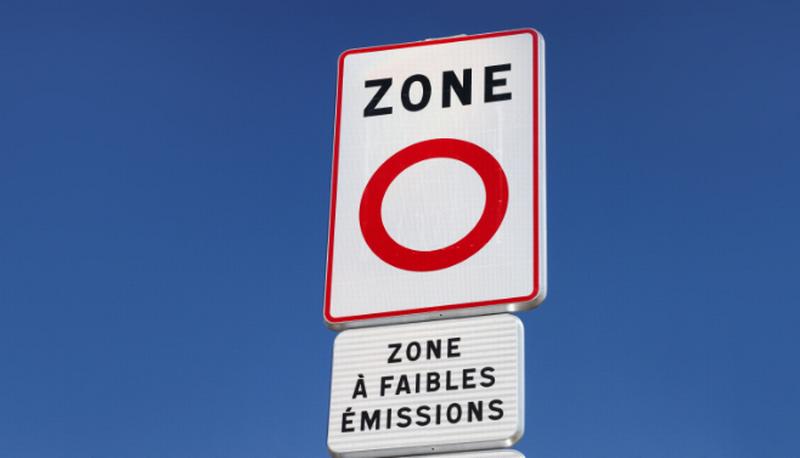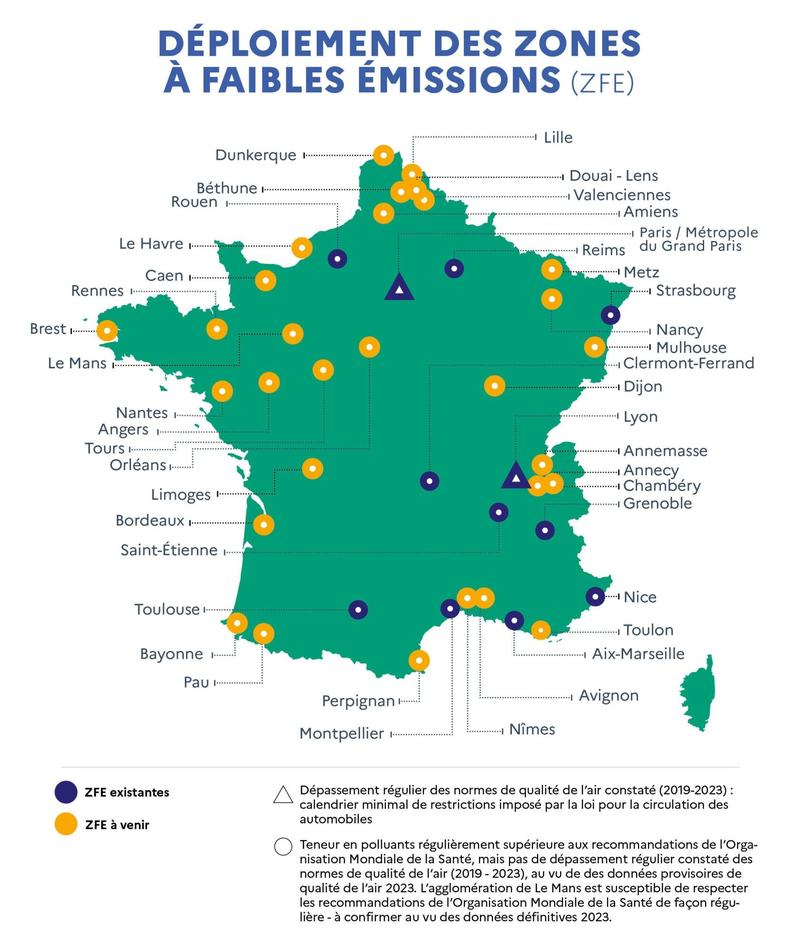This page has been automatically translated. Please refer to the page in French if needed.
Pollution control measures
2025 Crit’air 3 car restrictions: which agglomerations are affected?
Publié le 05 avril 2024 - Directorate for Legal and Administrative Information (Prime Minister)
The first air quality figures for 2023 show an improvement in the main French agglomerations. Service-Public.fr Reminds you of the main features of the EPZ, which consists in restricting the circulation of the most polluting vehicles in cities in order to reduce pollution and thus improve air quality.

On 3e Ministerial Committee for Air Quality on 19 March 2024, the Minister for the Ecological Transition confirmed the continuous improvement of air quality in the main French agglomerations and the consequences for existing or future low-emission zones (EPZs).
The EPZ obligations are lighter for agglomerations of Marseille, Rouen and Strasbourg, which no longer regularly exceed regulatory air quality thresholds. They are no longer obliged to continue implementing the legal timetable which provided for the restriction of the movement of Crit’air 3 cars to 1er January 2025.
In total, 40 agglomerations are now placed in "vigilance territories". The 2 agglomerations of Paris and Lyon are still subject to the obligations relating to ‘effective EPZ territories’ due to their regular exceedance of the threshold limits.
Please note
Effective EPZ territories and surveillance territories
Low emission zones aim to reduce the health impact of road traffic-induced air pollution. The implementation of this measure shall be gradual and determined by local air quality levels.
The 2021 Climate and Resilience Act provides for the establishment of EPZs by 1er january 2025 in all agglomerations of more than 150,000 inhabitants where the air quality values recommended by the World Health Organization (WHO) are exceeded. 42 agglomerations are concerned.
Only agglomerations which regularly exceed the regulatory thresholds must comply with a timetable of restrictions which will lead to restrictions on the circulation of Crit'air 3 to 1 carser January 2025: Paris and Lyon are concerned.
Effective EPZ Territories
Agglomerations that consistently exceed regulatory air quality thresholds are effective EPZ territories (Paris and Lyon); they must respect the legislative timetable, the next deadline of which provides for restrictions for diesel cars over 14 years of age and petrol cars over 19 years of age on 1er January 2025 (Crit’Air 3).
Watchdog Territories
Agglomerations that meet regulatory air quality thresholds but have pollution levels above the WHO recommended values are vigilance territories. They are divided into 2 categories:
- agglomerations which have not yet introduced rules (30 agglomerations): they must restrict traffic before 1er January 2025 means cars registered before 31 December 1996 and/or light commercial vehicles registered before 30 September 1997 and/or heavy goods vehicles registered before 30 September 2001, i.e. unclassified vehicles;
- The agglomerations where EPZs already exist (10 agglomerations): all agglomerations have at least established or provided for the minimum restrictions laid down by law and no longer have an obligation to reinforce their current restrictions.
Infographie - Deployment of low-emission areas in 2024

FYI
The EPZ system is based on the Crit'air (or air quality certificate) system, which classifies vehicles according to their pollutant emissions of fine particulates and nitrogen oxides. This thumbnail is mandatory for driving in low emission zones established by local authorities, or to circulate when the prefect introduces differentiated traffic during pollution episodes. You can order online.
Please note
Low-emission zones exist in 13 other European countries (Germany, England, Austria, Belgium, Czech Republic, Denmark, Scotland, Spain, Greece, the Netherlands, Italy, Portugal, Sweden) and for some for more than 20 years.
Additional topics
Service-Public.fr
Service-Public.fr
Ministry of the Environment
Breathing better in town
Agenda
Déplacements
À partir du 1 mai 2024
Publié le 26 avril 2024
Impôts
À partir du 11 avr. 2024
Publié le 11 avril 2024

